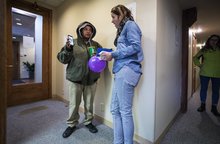0
News Article
Community:
Jun 12, 2019
About half of the student body at one Ohio elementary school has witnessed drug use at home. Educators spend time every day teaching the children how to cope.
Authored by: Dan Levin for The New York Times
Topics: Child welfare, Early childhood, Education, Health, Substance abuse, Youth
 Shared by Housing Is
Shared by Housing Is
Housing Is posted a
on Jun 13, 2019
Dan Levin for The New York Times
About half of the student body at one Ohio elementary school has witnessed drug use at home. Educators spend time every day teaching the children how to cope.
0
Policy Brief
Community:
May 1, 2019
Stable housing plays a vital role in people’s recovery from substance use disorders (SUDs). An inability to pay rent and the threat of losing housing can lead to stress that triggers substance misuse and relapse. People experiencing homelessness who also have SUDs typically find it difficult to address their substance use without a safe place to live, because they often use alcohol or drugs to cope with the dangers of life on the streets. In 2018, Congress passed the SUPPORT for Patients and Communities Act (known as the SUPPORT Act), which provided a variety of new programs and funding opportunities to help states and localities address the opioid epidemic and broadly help people with substance use disorders.
Authored by: Center on Budget and Policy Priorities
Topics: Homelessness, Housing, Legislation & Policy, Low-income, Mental health, Research, Substance abuse
 Shared by Housing Is
Shared by Housing Is
Housing Is posted a
on May 2, 2019
Center on Budget and Policy Priorities
Stable housing plays a vital role in people’s recovery from substance use disorders (SUDs). An inability to pay rent and the threat of losing housing can lead to stress that triggers substance misuse and relapse.
0
News Article
Community:
Apr 21, 2019
The county’s preliminary results look promising: more than 78% of Vital clients were booked into jail less often once enrolled in the program for at least six months. On average, Vital participants went to jail about a third less often per year compared to the three years before their enrollment. A typical client had at least two fewer bookings into a King County Jail compared to the three years before entering the program.
Authored by: Vianna Davila for The Seattle Times
Topics: Criminal justice, Health, Homelessness, Housing, Mental health, Partnerships, Substance abuse
 Shared by Housing Is
Shared by Housing Is
Housing Is posted a
on Apr 25, 2019
Vianna Davila for The Seattle Times
The county’s preliminary results look promising: more than 78% of Vital clients were booked into jail less often once enrolled in the program for at least six months. On average, Vital participants went to jail about a third less often per year compared to the three years before their enrollment.
0
News Article
Community:
Apr 2, 2019
The dormitory-style transitional housing program, run by Portland-headquartered nonprofit Bridges to Change, is designed to repair some of the harm the criminal justice system historically has inflicted on communities of color.
Authored by: Zoe Sullivan for Next City
Topics: Criminal justice, Housing, Mental health, Metrics, Pacific Northwest, Racial inequalities, Substance abuse, Workforce development
 Shared by Housing Is
Shared by Housing Is
Housing Is posted a
on Apr 4, 2019
Zoe Sullivan for Next City
The dormitory-style transitional housing program, run by Portland-headquartered nonprofit Bridges to Change, is designed to repair some of the harm the criminal justice system historically has inflicted on communities of color.
0
News Article
Community:
Feb 12, 2019
The Board of Supervisors on Tuesday gave the green light for San Diego County to apply for up to $125 million in state funding to help people get off the streets and receive mental health treatment.
Authored by: Alexander Nguyen for Times of San Diego
Topics: Funding, Homelessness, Housing, Legislation & Policy, Low-income, Mental health, Stability, Substance abuse, West Coast
 Shared by Mica O'Brien
Shared by Mica O'Brien
Mica O'Brien posted a
on Feb 14, 2019
Alexander Nguyen for Times of San Diego
The Board of Supervisors on Tuesday gave the green light for San Diego County to apply for up to $125 million in state funding to help people get off the streets and receive mental health treatment.
0
News Article
Community:
Feb 4, 2019
Officials celebrated clearing the encampments, one of the top goals of the Philadelphia Resilience Project, the city’s emergency plan for Kensington. But, they said, it’s only the beginning of the larger effort to help people in addiction and heal a neighborhood ravaged by opioids.
Authored by: Joel Wolfram for WHYY
Topics: Homelessness, Housing, Legislation & Policy, Low-income, Substance abuse
 Shared by Mica O'Brien
Shared by Mica O'Brien
Mica O'Brien posted a
on Feb 7, 2019
Officials celebrated clearing the encampments, one of the top goals of the Philadelphia Resilience Project, the city’s emergency plan for Kensington. But, they said, it’s only the beginning of the larger effort to help people in addiction and heal a neighborhood ravaged by opioids.
0
News Article
Community:
Jan 18, 2019
The State of Arizona’s Medicaid agency (AHCCCS) recognizes the vital importance of safe, decent and affordable housing to health. With a portfolio of over 3,000 units of affordable housing for Medicaid members with a determination of serious mental illness (SMI) and/or substance use disorder, housing is a major component of how the State of Arizona assists those trying to recover and stabilize.
Authored by: Josh Crites for The Journal of Housing & Community Development
Topics: Cost effectiveness, Health, Housing, Low-income, Medicaid / Medicare, Mental health, Partnerships, Substance abuse
 Shared by Housing Is
Shared by Housing Is
Housing Is posted a
on Jan 22, 2019
Josh Crites for The Journal of Housing & Community Development
The State of Arizona’s Medicaid agency (AHCCCS) recognizes the vital importance of safe, decent and affordable housing to health.
0
Policy Brief
Community:
Nov 2, 2018
The new opioid legislation—the Substance Use-Disorder Prevention That Promotes Opioid Recovery and Treatment for Patients and Communities Act (the SUPPORT Act)—signed into law on October 24 includes targeted expansions in treatment, including provisions that provide funding or flexibility to states to expand access to treatment for substance use disorders (SUD), including opioid use disorder (OUD), and health care more generally in Medicaid and Medicare.
Authored by: Eva H. Allen and Lisa Clemans-Cope for The Urban Institute
Topics: Affordable Care Act, Health, Legislation & Policy, Low-income, Medicaid / Medicare, Safety, Substance abuse
 Shared by Mica O'Brien
Shared by Mica O'Brien
Mica O'Brien posted a
on Nov 5, 2018
Eva H. Allen and Lisa Clemans-Cope for The Urban Institute
The new opioid legislation—the Substance Use-Disorder Prevention That Promotes Opioid Recovery and Treatment for Patients and Communities Act (the SUPPORT Act)—signed into law on October 24 includes targeted expansions in treatment, including provisions that provide funding or flexibility to states
0
Policy Brief
Community:
Oct 24, 2018
On Wednesday, October 24, President Trump signed into law bipartisan legislation, H.R. 6, the SUPPORT for Patients and Communities Act. This sweeping legislation contains many provisions that could help children, youth, and families experiencing homelessness who are impacted by the opioid crisis, as well as provisions to help all children and youth who experience trauma.
Authored by: SchoolHouse Connection
Topics: Child welfare, Dual-generation, Early childhood, Family engagement, Housing, Legislation & Policy, Low-income, Substance abuse, Supportive housing
 Shared by Mica O'Brien
Shared by Mica O'Brien
Mica O'Brien posted a
on Oct 31, 2018
On Wednesday, October 24, President Trump signed into law bipartisan legislation, H.R. 6, the SUPPORT for Patients and Communities Act.
0
News Article
Community:
Oct 23, 2018
In January, mothers with substance-abuse disorders will have a long-term resource to help break the cycle of their addiction. That’s when Tucson Medical Center and CODAC Health, Recovery and Wellness, in partnership with the Connie Hillman Family Foundation, open their new transitional housing program in midtown Tucson for mothers who are battling drug or alcohol addiction.
Authored by: Mikayla Mace for Arizona Daily Star
Topics: Homelessness, Housing, Low-income, Partnerships, Safety, Stability, Substance abuse
 Shared by Mica O'Brien
Shared by Mica O'Brien
Mica O'Brien posted a
on Oct 25, 2018
Mikayla Mace for Arizona Daily Star
In January, mothers with substance-abuse disorders will have a long-term resource to help break the cycle of their addiction.
0
News Article
Community:
Sep 12, 2018
As the devastating effects of the opioid crisis continue, a growing body of research supports the efficacy and safety of this sort of medication-assisted treatment (also called MAT) for drug recovery, when combined with psychotherapy. But the use of any of these medicines — a list that includes methadone and naltrexone, as well as Suboxone — remains frowned upon by most operators of sober living houses.
Authored by: Nina Feldman for NPR
Topics: Health, Housing, Substance abuse
 Shared by Mica O'Brien
Shared by Mica O'Brien
Mica O'Brien posted a
on Sep 18, 2018
As the devastating effects of the opioid crisis continue, a growing body of research supports the efficacy and safety of this sort of medication-assisted treatment (also called MAT) for drug recovery, when combined with psychotherapy.
0
Policy Brief
Community:
Aug 9, 2018
Social determinants of health are the economic and social conditions that affect health outcomes and are the underlying, contributing factors of health inequities. Examples include housing, educational attainment, employment and the environment.
Authored by:
Topics: Affordable Care Act, Disabilities, Health, Homelessness, Housing, Low-income, Medicaid / Medicare, Mental health, Partnerships, Place-based, Substance abuse, Supportive housing
 Shared by Housing Is
Shared by Housing Is
Housing Is posted a
on Aug 9, 2018
Social determinants of health are the economic and social conditions that affect health outcomes and are the underlying, contributing factors of health inequities. Examples include housing, educational attainment, employment and the environment.
0
Interactive
Community:
Jul 20, 2018
Kaiser Permanente NW Community Benefit intends to award at least $1.5 million in community grants to support organizations that help people with behavioral health challenges to secure and maintain safe, stable housing. A minimum of five grants of up to $325,000 will be awarded for projects lasting 3 ½ years. Projects must include the involvement of peers or community health workers (CHWs) and must involve collaboration between housing providers, health care providers (including behavioral health service providers) and those community organizations employing peers or CHWs.
Authored by:
Topics: Funding, Health, Homelessness, Housing, Mental health, Pacific Northwest, Partnerships, Place-based, Preventative care, Substance abuse
 Shared by Housing Is
Shared by Housing Is
Housing Is posted a
on Jul 20, 2018
Kaiser Permanente NW Community Benefit intends to award at least $1.5 million in community grants to support organizations that help people with behavioral health challenges to secure and maintain safe, stable housing.
0
Policy Brief
Community:
Jul 17, 2018
The Denver Social Impact Bond program is an initiative aimed at measurably improving the lives of people most in need by driving resources towards better, more effective programs. Social Impact Bonds are a unique type of performance-based contract where private and/or philanthropic lenders loan funds to accomplish a specific objective and are repaid based on whether the program achieves its goals. Denver’s Social Impact Bond program will use funds from lenders to provide housing and supportive case management services to at least 250 homeless individuals who frequently use the city’s emergency services, including police, jail, the courts and emergency rooms.
Authored by:
Topics: Community development, Cost effectiveness, Criminal justice, Health, Homelessness, Housing, Low-income, Mental health, Partnerships, Stability, Substance abuse, West Coast
 Shared by Housing Is
Shared by Housing Is
Housing Is posted a
on Jul 17, 2018
The Denver Social Impact Bond program is an initiative aimed at measurably improving the lives of people most in need by driving resources towards better, more effective programs.
0
Policy Brief
Community:
Jul 10, 2018
This brief explores how state Medicaid agencies have utilized a variety of federal authorities and delivery systems to increase access to supportive housing services and highlights important implementation considerations.
Authored by:
Topics: Cost effectiveness, Criminal justice, Data sharing, Funding, Health, Healthy homes, Homelessness, Housing, Legislation & Policy, Low-income, Medicaid / Medicare, Mental health, Partnerships, Substance abuse, Supportive housing
 Shared by Housing Is
Shared by Housing Is
Housing Is posted a
on Jul 10, 2018
This brief explores how state Medicaid agencies have utilized a variety of federal authorities and delivery systems to increase access to supportive housing services and highlights important implementation considerations.


 Shared by Housing Is
on Jun 13, 2019
Shared by Housing Is
on Jun 13, 2019

 Shared by Housing Is
on May 2, 2019
Shared by Housing Is
on May 2, 2019

 Shared by Housing Is
on Apr 25, 2019
Shared by Housing Is
on Apr 25, 2019


 Shared by Housing Is
on Apr 4, 2019
Shared by Housing Is
on Apr 4, 2019





 Shared by Housing Is
on Jan 22, 2019
Shared by Housing Is
on Jan 22, 2019




 Shared by Housing Is
on Aug 9, 2018
Shared by Housing Is
on Aug 9, 2018
 Shared by Housing Is
on Jul 20, 2018
Shared by Housing Is
on Jul 20, 2018
 Shared by Housing Is
on Jul 17, 2018
Shared by Housing Is
on Jul 17, 2018
 Shared by Housing Is
on Jul 10, 2018
Shared by Housing Is
on Jul 10, 2018